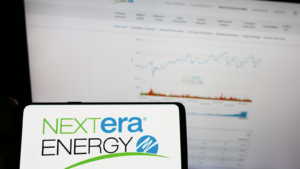An important factor contributing to successful flourishing is the decrease in cost for developing renewable energy technologies. For example, solar panels’ and wind turbines’ prices have decreased. So, this has made green energy both profitable and scalable. Additionally, the integration of advanced technologies, such as artificial intelligence, is playing a role. AI is optimizing energy production and efficiency, further propelling the sector forward €‹.
Another driver is an increasing number of corporations announcing a desire to source all electricity from renewable energy sources. In turn, the move stimulates the development of green energy facilities.
Green energy stocks represent some of the best value in the market today. This is thanks to valuation ratios trading far below the market average and tech stocks, which could be in an overheated position.
Therefore, let’s explore seven green energy stocks for investors to consider adding to their portfolios.
NextEra Energy (NEE)

A compelling investment, NextEra Energy (NYSE:NEE) is poised to benefit from Florida’s robust economic growth. This catalyst is from its subsidiary, Florida Power and Light, which grew its customer base by 100,000 new billings from Q1 of fiscal year 2023.
Moreover, NEE is a powerhouse when it comes to increasing its backlog of expansion projects by 2,765 megawatts (MW) to a total of 21,500 MW, net of 1,165 MW of projects placed in service. I foresee that energy demand will pick up substantially. A natural consequence of rising electricity needs is to decarbonize it. So with NEE being one the largest wind and solar generation companies globally, the domestic U.S. market should be highly accretive for the company.
On the valuation front, NEE trades for just 25x earnings and 6x sales, which is reasonable as both its top and bottom lines are expected to strengthen steadily moving forward.
First Solar (FSLR)

I believe First Solar (NASDAQ:FSLR) is an outstanding investment opportunity, particularly given the recent pullback and strong Q2 FY24 performance.
Some tailwinds for FSLR include a significant expansion of its U.S. manufacturing capacity, with new facilities expected to be operational by late 2025. In my view, this positions it as a key player against Chinese competitors.
China is leading the pack amongst companies in the green economy. According to the Reuters, “Chinese companies will have at least 20 gigawatts‘ worth of annual solar panel production capacity on U.S. soil within the next year, enough to serve about half the U.S. market.”
I feel that it’s important for investors to understand this context. Additional U.S. subsidies will come from the government to keep the U.S. and China on an equal footing. The assistance will be highly beneficial for First Solar.
Also, the market seems to agree that FLSR could be a long-term winner due to its enhanced production plans. Furthermore, analysts predict the stock price to rise 30.69% within the next twelve months.
Canadian Solar (CSIQ)

Canadian Solar (NASDAQ:CSIQ) may be one of those green energy stocks for investors looking to diversify their portfolios away from exposure to the U.S. market while also preserving substantial upside potential.
The reason I’m bullish on CSIQ stock is that it has a growing share of the photovoltaic solar installation market, currently at 5% at the time of writing. And, it diversifies into related business lines, like battery storage, to improve earnings.
Last quarter, its results were also impressive, with both revenues and gross margins falling within its guidance ranges of $1.3 billion and 19%, respectively. Also, Canadian Solar reported record deliveries of its e-STORAGE product. This highlights it diversification efforts that are paying off while also being commercially successful.
Enphase Energy (ENPH)

Enphase Energy (NASDAQ:ENPH) presents a strong investment case due to its robust market position. Some factors that add to the bull case for ENPH include its five-year revenue CAGR of 29.69% and its substantial market share in the microconverter segment of the industry.
Additionally, ENPH has been on a mission to expand beyond the borders of the U.S. and Europe. Revenues have jumped by 70% year-over-year (YOY). Also, it is expanding its business lines with additional product launches such as its IQ8 microinverters, which offer increased energy efficiency.
ENPH trades at 110.36x earnings. Superficially, this looks overvalued, even compared with tech stocks. However, the company’s EPS in FY2025 is expected to increase 83%, jumping to 4.83.
These kinds of massive earnings forecasts may be setting the company up to fail if it’s unable to deliver on such big promises. But, its presence in Europe gives it a reasonable chance of getting there.
Brookfield Renewable Partners (BEP)

Brookfield Renewable Partners (NYSE:BEP) is one of the best green energy stocks for investors who are seeking regular income as well as capital appreciation. Indeed, BEP is a high dividend payer, with a dividend yield of 5.83% at the time of writing. To put that number in context, that’s close to the long-term average of the S&P 500 over the last thirty years.
Also, BEP’s cash flows and top-line expansion appear steady. BEP benefits from a stable revenue stream, with 90% of its generation contracted and an average contract duration of 13 years.
However, it’s not just income that BEP offers. It has grown its stock price by 28.56% over the past five years. When dividends are included, that figure matches the returns of some of the most aggressive tech stocks on Wall Street.
Now might be a good time for investors interested in green energy stocks to snap up Brookfield Renewable Partners. It’s down 8.77% over the past 52 weeks, so buying early may lock in this growing dividend.
SolarEdge Technologies (SEDG)

SolarEdge Technologies (NASDAQ:SEDG) appears as a dark horse among the more obvious green energy stocks to buy in this list. Analysts cite poor inventory controls as one of the main issues in its inventory management. As of Q1 FY24, the company’s inventory was $1.5 billion, significantly higher than its quarterly revenue.
Also, substantial cash flow issues for SEDG stock is a problem. Namely, this has been negative at 563.59 million for the last twelve months. In the short-term, it appears that SEDG will need to continue to fund its operations via borrowed cash and possible equity raises.
However, I think that SEDG could be a winner owing to its highly solvent position. Its current and long-term liabilities are far less than its assets, with a current and quick ratio at 4.54 and 1.65, respectively.
Furthermore, high interest rates and inflation have dampened its ability to offload its inventory. Yet, both of these factors are likely abating in the U.S. and in other key developed markets.
Analysts predict that its EPS will rise steadily throughout FY25 and beyond, which makes it one of those green energy stocks for investors with a high risk tolerance.
Clearway Energy (CWEN)

Clearway Energy (NYSE:CWEN) is another one of those green energy stocks for dividend seekers. Its substantial portfolio of green energy assets stood at 8.7 GW at the time of writing, all supported by a 5.84% dividend yield. Unlike some of the other picks in this list, CWEN’s presence in the green energy market is highly diversified, including wind, solar and natural gas generation assets.
Recent strategic moves, including $182 million in growth investments for new wind and solar projects, position CWEN for future expansion.
I also think that CWEN could have a breakout quarter, and possibly its best ever quarter in Q3. Analysts are predicting that CWEN’s stock price will climb 9.49% in the next 12 months, but a surprised market could see it surge higher than this.
On the date of publication, Matthew Farley did not have (either directly or indirectly) any positions in the securities mentioned in this article. The opinions expressed are those of the writer, subject to the InvestorPlace.com Publishing Guidelines.
On the date of publication, the responsible editor did not have (either directly or indirectly) any positions in the securities mentioned in this article.
Matthew started writing coverage of the financial markets during the crypto boom of 2017 and was also a team member of several fintech startups. He then started writing about Australian and U.S. equities for various publications. His work has appeared in MarketBeat, FXStreet, Cryptoslate, Seeking Alpha, and the New Scientist magazine, among others.
